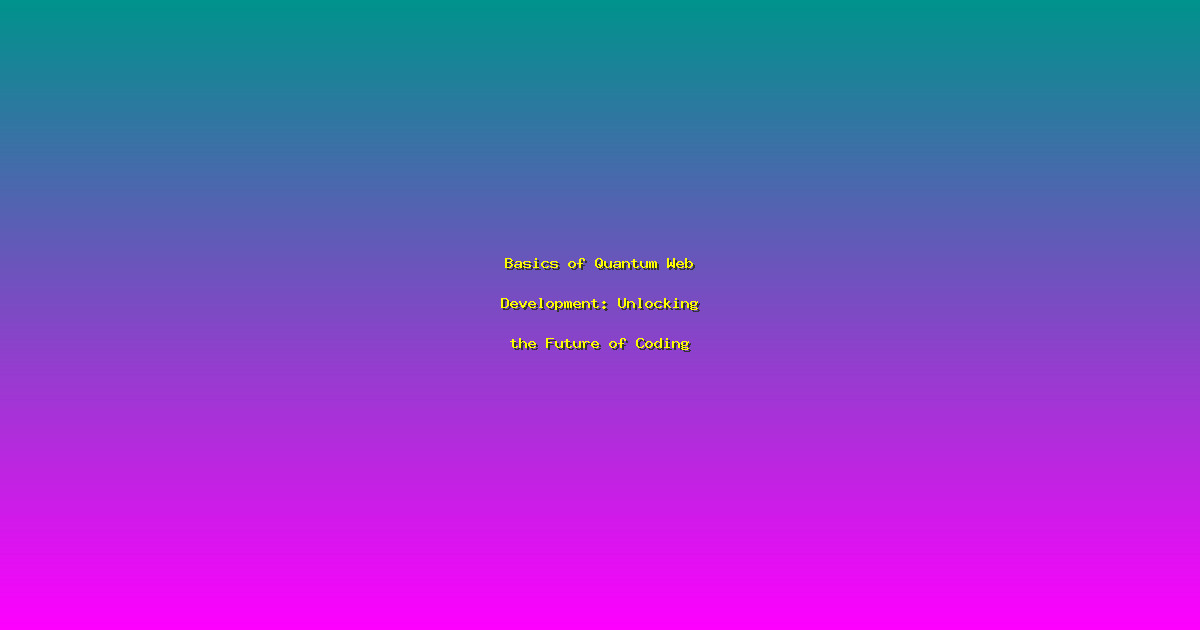Basics of Quantum Web Development: Unlocking the Future of Coding
The digital age has seen incredible advancements in technology, from artificial intelligence and machine learning to cloud computing and blockchain. Quantum technology, another groundbreaking development, is poised to revolutionize the way we develop applications, including web development. Quantum web development combines the principles of quantum computing with traditional web development to create more powerful and efficient web applications. This article delves into the basics of quantum web development, exploring its principles, tools, and how it's shaping the future of coding.
Understanding Quantum Computing
To comprehend quantum web development, it's essential to first understand quantum computing. Unlike classical computers, which use bits, quantum computers use qubits. Qubits operate on principles of quantum mechanics, where they can exist in multiple states simultaneously through superposition and can be entangled with other qubits, allowing for parallel processing that can solve complex problems faster than classical computers. This power can be harnessed to create web applications that can process vast amounts of data and perform complex calculations in real-time, which is what quantum web development aims to achieve.
Principles of Quantum Web Development
Quantum web development involves creating web applications that can leverage the power of quantum computing. This is achieved by integrating quantum algorithms into web applications, enabling them to perform tasks that would be impossible or impractical for classical computers. Developers need to understand the basics of quantum mechanics and how to write quantum algorithms to be able to develop quantum web applications. Quantum web development also requires knowledge of classical web development, including HTML, CSS, and JavaScript, as well as quantum programming languages such as Q#, Qiskit, and Quipper.
Tools and Platforms for Quantum Web Development
Developers interested in quantum web development can start with tools and platforms designed to facilitate this new form of coding. Microsoft’s Quantum Development Kit (QDK) and IBM’s Qiskit are prominent examples, providing a comprehensive environment for developing, simulating, and deploying quantum applications. These platforms come with their own programming languages, such as Q# for QDK and Python-based Qiskit, which are tailored for quantum computing. Understanding these tools is crucial for anyone looking to delve into quantum web development.
Applications of Quantum Web Development
The applications of quantum web development are vast and varied, ranging from optimizing complex systems to enhancing cryptographic security. Quantum algorithms can be integrated into web applications to improve performance in areas such as search, optimization, and simulation. This could mean faster data processing, more accurate predictions, and more secure transactions on the web. Additionally, quantum web development could lead to more efficient and effective solutions in fields like medicine, finance, and logistics.
FAQs
1. What is quantum computing?
Quantum computing is a type of computing that uses quantum-mechanical phenomena, such as superposition and entanglement, to perform operations on data. This can lead to much faster and more efficient computations for certain types of problems compared to traditional, or classical, computing.
2. How does quantum computing impact web development?
Quantum computing can significantly speed up certain processes involved in web development, such as data encryption, decryption, and complex data analysis. It can also enable the creation of new types of applications and services that are not feasible with classical computing alone.
3. What are the key skills needed for quantum web development?
To excel in quantum web development, a developer should be proficient in classical web development, have a foundational understanding of quantum mechanics, and be skilled in quantum programming languages like Q# or Python-based frameworks like Qiskit.
4. Are there any current examples of quantum web applications?
While still in the experimental phase, there are ongoing projects and prototypes that demonstrate the potential of quantum web applications. These include simulations, optimization algorithms, and secure communication systems, showcasing the potential of quantum technologies in web development.
5. What are the challenges in quantum web development?
Challenges include the complexity of quantum mechanics, the scarcity of quantum computers accessible for development, and the need for specialized knowledge and tools. Additionally, quantum algorithms can be difficult to design and debug.
6. How can I start learning quantum web development?
You can start by familiarizing yourself with the basics of quantum mechanics, learning quantum programming languages such as Q#, and experimenting with quantum simulators and platforms like Microsoft’s QDK or IBM’s Qiskit. Online courses and workshops can also provide a good introduction to the field.
Conclusion and Call to Action
Quantum web development is at the forefront of technological innovation, offering immense potential to transform the way we build and interact with web applications. As quantum computers become more accessible and quantum algorithms more refined, the possibilities for innovation and new applications will only grow. If you’re a web developer or a tech enthusiast, diving into quantum web development could be the key to opening up a new world of opportunities in coding and beyond. Start your journey into the quantum realm today and be part of the next big revolution in web development!

